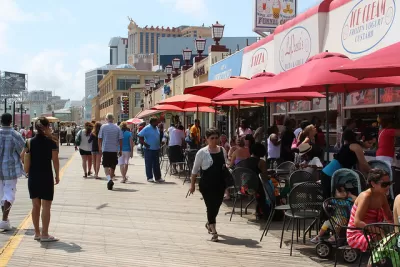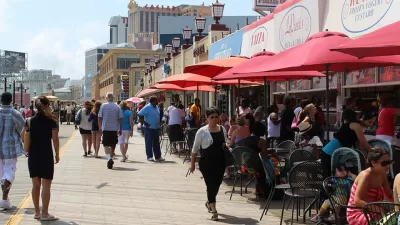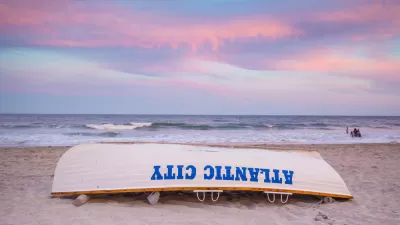Atlantic City, New Jersey, has been down on its luck lately. But, in the wake of Superstorm Sandy, AC could become the ideal laboratory for developing technologies and practices to help coastal cities build resiliency in the face of climate change.

One of the biggest problems with urban resiliency is that it's hard to test what works and what doesn't. Engineers can't create hurricanes or tidal flooding, and they can't build entire cities to see what happens. Or can they?
As one of the objects of Superstorm Sandy's wrath—not to mention other storms and hurricanes—Atlantic City, New Jersey, already has plenty of experience with coastal hazards. And, as the climate changes and seas rise, it's expecting to experience a lot more. The decline of gambling and tourism has left Atlantic City in a financially and ecologically precarious position.
All of this, according to a new proposal from the architecture firm Perkins+Will, makes Atlantic City an ideal place to study coastal hazards and develop techniques and technologies to combat them. The proposal envisions a nearly total transformation of the city into a research "campus." While much scientific research takes place in expensive cities like Boston and San Diego, the proposal's authors note that AC's vacant casinos can provide cheap housing for teams of scientists and engineers who can turn casino floors into enormous labs. Places that once sucked gamblers' wallets dry can help cities avoid being submerged.
"If somebody wanted to test structures being able to withstand flooding or wind, you could imagine creating a wind tunnel or some sort of floodable space," Perkins+Will senior urban designer planner Daniel Windsor told Fast Company. "Or if it's about emergency response, you can imagine creating these large-scale command center simulators where people can come in and train on software or large command-center-like simulations."
Perkins+Will created the proposal entirely on spec, without a public- or private-sector client, as a thought experiment. The Fast Company article does not quote any city officials, so the proposal remains speculative at best.
"In Atlantic City's case, the pitch for a resiliency-first redesign was a matter of timing. Windsor says the P+W task force had monitored issues like wildfires in Northern California, drought in Southern California, and sea-level rise on the East Coast before settling on Atlantic City for its first full-fledged resiliency showcase....Windsor likens Atlantic City—which spans about 4 square miles—to a college campus. And it's not an accidental comparison: Perkins+Will imagines academic institutions working alongside government agencies and scientists in its utopian A.C."
"We're hoping that this furthers the dialogue and that we can start to work with people in Atlantic City to help diversify the economy and potentially integrate some of these strategies and work with institutions and things like that," Windsor says. "Right now, it's an idea, and we're hoping that it becomes more."
FULL STORY: Could Atlantic City Become an Innovation Hub for Climate Change and Resiliency?

Planetizen Federal Action Tracker
A weekly monitor of how Trump’s orders and actions are impacting planners and planning in America.

Maui's Vacation Rental Debate Turns Ugly
Verbal attacks, misinformation campaigns and fistfights plague a high-stakes debate to convert thousands of vacation rentals into long-term housing.

Restaurant Patios Were a Pandemic Win — Why Were They so Hard to Keep?
Social distancing requirements and changes in travel patterns prompted cities to pilot new uses for street and sidewalk space. Then it got complicated.

In California Battle of Housing vs. Environment, Housing Just Won
A new state law significantly limits the power of CEQA, an environmental review law that served as a powerful tool for blocking new development.

Boulder Eliminates Parking Minimums Citywide
Officials estimate the cost of building a single underground parking space at up to $100,000.

Orange County, Florida Adopts Largest US “Sprawl Repair” Code
The ‘Orange Code’ seeks to rectify decades of sprawl-inducing, car-oriented development.
Urban Design for Planners 1: Software Tools
This six-course series explores essential urban design concepts using open source software and equips planners with the tools they need to participate fully in the urban design process.
Planning for Universal Design
Learn the tools for implementing Universal Design in planning regulations.
Heyer Gruel & Associates PA
JM Goldson LLC
Custer County Colorado
City of Camden Redevelopment Agency
City of Astoria
Transportation Research & Education Center (TREC) at Portland State University
Jefferson Parish Government
Camden Redevelopment Agency
City of Claremont





























